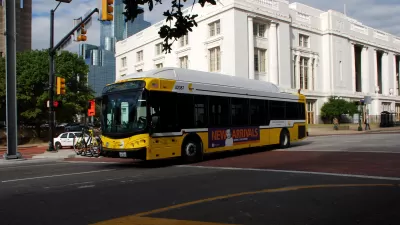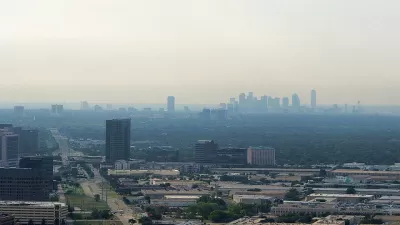According to one Dallas suburbanite, the American lawn is a "decadent and unsustainable totem[s] of middle-class prosperity."

No single feature of a suburban residential community contributes as much to the charm and beauty of the individual home and the locality as well-kept lawns," declared Abraham Levitt, founder of Levittown, one of America's first suburban tract developments.
Americans imported the concept of a residential lawn from England, where rainfall is abundant year round. However, even there, lawns were historically a luxury. "For several centuries, lawns were the exclusive purview of very rich Europeans, people who were wealthy enough to keep large swaths of land out of productive cultivation and afford the labor required to keep the grass neatly scythed," writes Nicholson.
Today, Nicholson points out, Americans allocate three times more land to lawns than corn. As the largest irrigated crop in the country, the acres of lawn would blanket the state of Mississippi. The environmental effects of maintaining these lawns are substantial.
According to National Geographic, "One sprinkler hose uses an estimated nine gallons of water per minute, or 530 gallons of water per hour. "Furthermore, Americans use 800 million gallons of gas per year to run gas-powered lawnmowers. A conservative estimate of the amount of air pollution emitted by one hour of running a gas mower is four hours. One study claims the equivalent of 11 new cars running for one hour each.
In drought-stricken California efforts are being made to reduce the amount of water wasted on lawn care, by regulating the number of hours per week a resident can water a lawn and relaxing restrictions on artificial turf. But Nicholson is not so optimistic about Texas.
They are effectively part of North Texas' infrastructure, there for however long the house it surrounds stands. But at the very least people can water a little less, rely on native plants a little bit more. If one simply must have the perfect golf-course lawn, at least let some kids play on it. Finally, if you see a lawn that's a bit overgrown or rough around the edges, don't call code enforcement; congratulate the neighbor on taking a principled stand with their forward-thinking mowing and irrigation policies."
FULL STORY: Death to Lawns

Planetizen Federal Action Tracker
A weekly monitor of how Trump’s orders and actions are impacting planners and planning in America.

Maui's Vacation Rental Debate Turns Ugly
Verbal attacks, misinformation campaigns and fistfights plague a high-stakes debate to convert thousands of vacation rentals into long-term housing.

Restaurant Patios Were a Pandemic Win — Why Were They so Hard to Keep?
Social distancing requirements and changes in travel patterns prompted cities to pilot new uses for street and sidewalk space. Then it got complicated.

In California Battle of Housing vs. Environment, Housing Just Won
A new state law significantly limits the power of CEQA, an environmental review law that served as a powerful tool for blocking new development.

Boulder Eliminates Parking Minimums Citywide
Officials estimate the cost of building a single underground parking space at up to $100,000.

Orange County, Florida Adopts Largest US “Sprawl Repair” Code
The ‘Orange Code’ seeks to rectify decades of sprawl-inducing, car-oriented development.
Urban Design for Planners 1: Software Tools
This six-course series explores essential urban design concepts using open source software and equips planners with the tools they need to participate fully in the urban design process.
Planning for Universal Design
Learn the tools for implementing Universal Design in planning regulations.
Heyer Gruel & Associates PA
JM Goldson LLC
Custer County Colorado
City of Camden Redevelopment Agency
City of Astoria
Transportation Research & Education Center (TREC) at Portland State University
Jefferson Parish Government
Camden Redevelopment Agency
City of Claremont





























